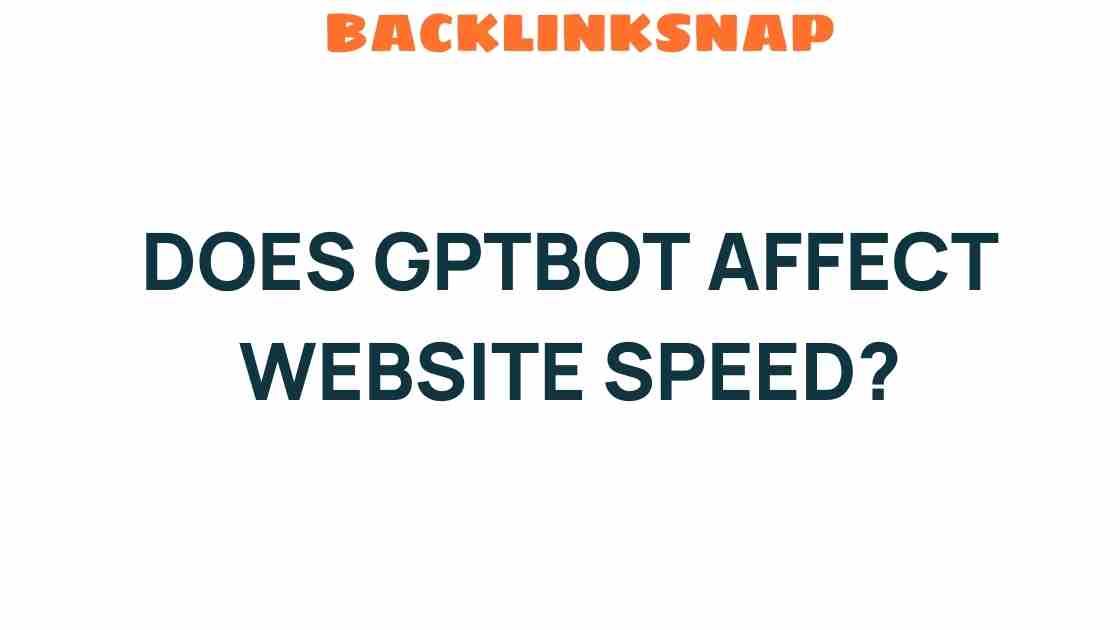Does GPTBot Impact Your Website Speed?
In the ever-evolving digital landscape, website speed has become a crucial factor not only for user experience but also for SEO performance. With the rise of AI crawlers like GPTBot, many webmasters are left wondering: does GPTBot impact your website speed? This article aims to demystify the relationship between AI crawlers, website speed, and overall site optimization.
Understanding GPTBot and Its Role in Web Traffic
GPTBot is an advanced AI crawler developed by OpenAI, designed to index web pages for better search results. Its primary goal is to enhance the search indexing process by efficiently gathering information from various websites. While the intentions behind such digital tools are positive, the concerns about their impact on website speed are valid.
When GPTBot visits a site, it sends requests to the server, similar to how other crawlers operate. However, the volume and frequency of these requests can raise questions about potential slowdowns. The good news is that, in most cases, well-optimized websites can handle these requests without experiencing noticeable degradation in performance.
Website Speed: Why It Matters
Website speed is a critical component of user experience and SEO. Google has emphasized the importance of page speed in its ranking algorithms. A faster website not only keeps visitors engaged but also reduces bounce rates, which can positively impact your site’s reputation and search rankings.
According to a study by Google, the probability of bounce increases by 32% as page load time goes from 1 second to 3 seconds. This statistic highlights the need for webmasters to focus on site optimization, especially when faced with AI crawlers that may increase server requests.
Does GPTBot Affect Your Website Speed?
The short answer is: it depends. Here are several factors to consider:
- Server Capacity: If your hosting plan has limited resources, a surge in requests from GPTBot could potentially slow down your website. However, scalable hosting solutions can accommodate increased traffic without issues.
- Site Optimization: Websites that are well-optimized with efficient code, compressed images, and minimal plugins are less likely to experience slowdowns, even with the added traffic from crawlers.
- Request Frequency: GPTBot’s crawling frequency may vary, and while it typically operates in a manner similar to other crawlers, monitoring its activity through server logs can help assess its impact on your site’s speed.
Strategies for Site Optimization to Accommodate AI Crawlers
To ensure that your site remains fast and responsive while accommodating AI crawlers like GPTBot, consider implementing the following strategies:
- Optimize Images: Use appropriate formats and compression tools to reduce image sizes without sacrificing quality.
- Minify CSS and JavaScript: Removing unnecessary characters from your code can help reduce load times.
- Implement Caching: Utilizing caching mechanisms can significantly speed up response times for returning visitors and crawlers alike.
- Upgrade Hosting Plans: If you frequently experience high traffic, consider upgrading to a hosting plan that offers more resources.
- Utilize Content Delivery Networks (CDNs): CDNs can distribute content across various locations, reducing the load on your main server and speeding up delivery times.
Monitoring Your Website for Speed and Performance
Regularly monitoring your website’s speed is essential, especially when new AI crawlers like GPTBot start indexing your pages. Tools such as Google PageSpeed Insights and GTmetrix can provide valuable insights into your site’s performance and identify areas for improvement.
Additionally, keeping an eye on your server logs will give you a better understanding of how often GPTBot is visiting your site and whether its activity correlates with any speed issues.
FAQs About GPTBot and Website Speed
- Q1: What is GPTBot?
A1: GPTBot is an AI crawler created by OpenAI, designed to index web pages efficiently for search purposes. - Q2: Can GPTBot slow down my website?
A2: It can, but only if your server resources are limited. Well-optimized sites typically handle AI crawler traffic without issues. - Q3: How can I check if GPTBot is affecting my website speed?
A3: Monitor your server logs and use performance tools to assess speed and page load times. - Q4: What strategies can improve my site’s speed?
A4: Optimize images, minify code, implement caching, and consider using a CDN. - Q5: Is GPTBot the only AI crawler I should be concerned about?
A5: No, there are many crawlers. Each may have different impacts based on their frequency and the resources they consume. - Q6: How often does GPTBot crawl websites?
A6: The frequency varies, but it generally operates similarly to other search engine crawlers.
Conclusion
In summary, while GPTBot and other AI crawlers can impact your website speed, the effect is often manageable with proper site optimization techniques. By focusing on improving your site’s performance and monitoring traffic patterns, you can ensure that your website remains fast and user-friendly, even in the face of increased web traffic from these advanced digital tools. Embracing these changes not only enhances user experience but also boosts your SEO performance in the long run.
For more information on optimizing your website for speed, consider checking out Google PageSpeed Insights for helpful tips and tools.
By understanding the dynamics of AI crawlers like GPTBot, you can take proactive steps to maintain optimal performance and ensure your site stands out in the digital landscape.
This article is in the category Website Performance and created by BacklinkSnap Team




